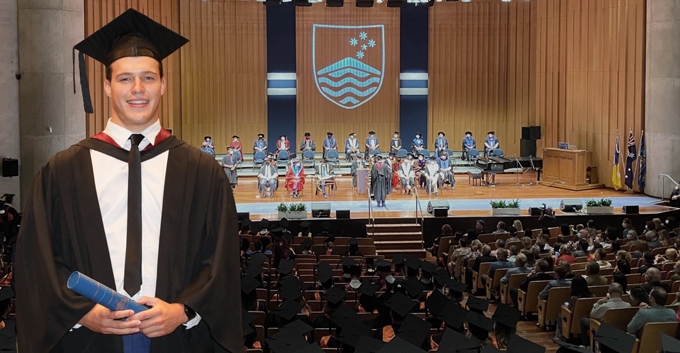“Immerse yourself as much as you can, as quick as you can.”
That’s the advice for new students from Ryan Pike who graduated in 2021 with Bachelor of Engineering (First Class Honours) and Bachelor of Science degrees. Ryan returned to campus on 9 February, 2022 to speak at a Conferring of Awards ceremony for those who, like Ryan, had graduated during a stage of the pandemic when such a large congregation had not been not possible.
In his Conferral remarks, Ryan expressed deep appreciation for his mentors and the learning opportunities he had both inside and outside of the classroom, in particular his trips overseas. But he had a bit of a rough go to begin with, describing himself as “nervous,” “fascinated,” and “overwhelmed” when he arrived on campus at the age of 18.
“I would say in my first year and a half, I was very much in a bit of a shell. I didn’t really communicate that effectively, I didn’t really even work with my peers that well,” he said, expressing his one regret during an interview prior to the cermony. “But after getting settled in and a bit more comfortable, you start opening up and you start realising that there are all these vast experiences.
A maths guy with a fascination for code technology, Ryan was drawn to engineering, mechatronics, and mathematical modelling.He said his understanding of the role of engineering in the world shifted dramatically when he received an Australian government grant which allowed him to travel to Cambodia as part of the Humanitarian Design Summit.
The Design Summit, which is administered by Engineers Without Borders, is the centerpiece of a Hummanitarian Engineering course taught by Prof. Jeremy Smith.
Ryan’s team went to Koh Preah, a tiny island with only 300 families. The island’s four villiages lacked all basic infrastructure, but Ryan found that the people there were “truly content with what they had”.
“We were tasked with surveying the strengths of the community and come up with a solution to help the overall quality of life,” Ryan said. The team proposed a natural pesticide made from fruits and plants instead of the chemical pesticide they had been using. Poor translation from Chinese to Khmer had replaced the word “pesticide” with “medicine,” and the community had been using it extensively. “It was quite possibly the most transformative 2 weeks of my life. On an island that lacked all basic infrastructure were people that were truly content with what they had,” Ryan said. Smith’s mentorship and the Design Summit shifted Ryan’s perspective “from seeing engineering as just a profession and looking at it more as like a social responsibility”.
This epiphany continued to guide Ryan over the final two years of his undergraduate studies. “I began to incorporate this outlook into my degree,” he said.
For his Capstone Engineering project, he devoted his skills to helping people with Type I diabetes. Capstone is a required course in which students self-select into research and development teams for engineering firms, researchers, and government organisations.
“Instead of pricking yourself 4 times per day, you can simply blow into a non-intrusive device that was developed by our team,” Ryan said. Next came an internship with 180 Waste Group, a start-up company doing innovate waste management for the medical industry.
“As you can imagine with COVID, there’s such an increase in personal protective equipment and general medical waste,” he said. “We were looking at how we can take new and innovative technology, and actually transform the waste and try and derive some value out of it.”
After completing the internship, Ryan stayed on at 180 Waste Group as its Chief Technology Officer, balancing the job while completing his degree. During that time, he revisited the Capstone project, this time as a client. “In two successful semesters we developed an approach for transforming medical waste into sustainable concrete, truly realising the circular economy,” he said.
Since graduating in July 2021, Ryan has secured a job as a research engineer working on safety driver monitoring, developing algorithms for face tracking. “It’s still that social impact side, which is the safety monitoring, but now I get to really utilise a lot of the robotics and computer vision stuff that I love”, said Ryan.
In looking back at his time as a student Ryan is grateful that he seized the opportunity to broaden his experiences, particularly overseas. While the trip to Cambodia was life-changing, Ryan also travelled to China, Singapore and Malaysia as an international student, did a 6-month exchange at the Technical University of Munich in Germany, where he learned from leading computer vision experts.
“It was like this global, awesome experience for two and a half years. And the only thing I would say is I wish I just had that mindset earlier on. When you go looking for the opportunities, they just open up.”
Ryan’s advice to new students is to “get amongst it, join the club”.
“There’s the learning and there’s the teaching, which is world class. But then there’s all this stuff that’s on offer behind the doors, and it’s those experiences, the exchange, the international trip, it was those that really added to the whole five-year journey,” he said.
In his Conferral remarks, Ryan described the ANU community as a “second family” and the library as a “second home.”
“I would like to express gratitude to my family for supporting me through this journey, and my friends and peers for the many late nights that we shared together. A special thanks goes to Professor Jochen Trumpf for being an amazing mentor and friend. To Professor Robert Mahony for introducing me into the exciting field of robotics and to Senior Lecturer Jeremy Smith for showing me the extremely fulfilling work around humanitarian engineering,” he said.

